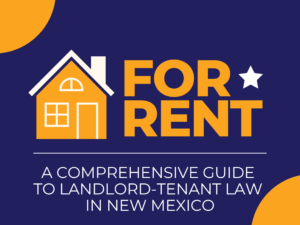A Comprehensive Guide to Landlord-Tenant Law in New Mexico
 As a tenant or landlord in New Mexico, understanding the basics of landlord-tenant law is essential to ensure a smooth and legally compliant rental experience. In this comprehensive guide, we will delve into the intricacies of New Mexico’s landlord-tenant laws, as discussed in a recent housing workshop featuring housing attorneys from New Mexico Legal Aid.
As a tenant or landlord in New Mexico, understanding the basics of landlord-tenant law is essential to ensure a smooth and legally compliant rental experience. In this comprehensive guide, we will delve into the intricacies of New Mexico’s landlord-tenant laws, as discussed in a recent housing workshop featuring housing attorneys from New Mexico Legal Aid.
You can also find all this information and more in New Mexico Legal Aid’s Renters’ Guide.
Navigating New Mexico Landlord-Tenant Law
New Mexico’s landlord-tenant law is primarily governed by the Uniform Owner Resident Relations Act, supplemented by various federal laws and regulations. It is crucial to be familiar with these laws to protect both landlords’ and tenants’ rights.
- Types of Notices for Eviction or Termination: New Mexico law allows different types of eviction notices, including non-payment of rent, material non-compliance, substantial violation notice, and a 30-day notice at the end of a lease term.
- Repair Issues and Right of Entry: Landlords have the right to enter the rental unit for repairs requested by the tenant or accompanied by a public official. However, they should not abuse this right and conduct inspections without a valid reason.
- Protection for Domestic Violence Victims: The Violence Against Women Act (VAWA) provides protection to tenants who are victims of domestic violence in federally subsidized properties, including section eight vouchers and low-income housing.
- Reasonable Accommodations for Disabilities: Tenants with disabilities can request reasonable accommodations, such as allowing service animals or changing rent due dates to align with benefit payments. Landlords must engage in an interactive process and may require documentation from a doctor.
- Prohibition of Discrimination: The fair housing act prohibits discrimination based on race, gender, religion, national origin, or disability. Landlords must provide reasonable accommodations to disabled tenants to ensure equal enjoyment of the dwelling unit.
- Source of Income Discrimination: Albuquerque and Bernalio County prohibit discrimination based on a tenant’s source of income. Landlords cannot refuse tenants with Section 8 vouchers or set higher rents specifically targeting voucher holders.
- Walkthrough Inspection and Written Lease: Before renting a unit, both parties should do a walkthrough inspection together and document any existing damage. Signing a written lease is required by law.
- Resources for Tenants: New Mexico Legal Aid provides sample forms for walkthrough checklists, and the Albuquerque Housing Authority offers free template leases.
Tenant Responsibilities and Rights
As a tenant, understanding your responsibilities and rights is crucial for a positive rental experience.
- Requesting Repairs in Writing: Tenants should request repairs in writing and document all communication regarding repairs.
- Withholding Rent: If repairs are not made, tenants may withhold rent, but they must have legitimate reasons and be prepared to pay within three days if the court decides against them.
- Documenting Lease Agreements: Keeping documentation of lease agreements, changes, and any communications with the landlord is vital for any disputes that may arise in the future.
- Move-Out Obligations: Tenants should clean the unit before moving out, return all keys/remotes, provide a forwarding address in writing, and request a move-out walk-through inspection with the owner.
- Damage Deposit Refund: Landlords must send an itemized statement or refund of the damage deposit within 30 days after move-out. Failure to do so may result in legal action from tenants for the return of the deposit plus penalties.
Legal Proceedings and Evidence Presentation
Understanding legal proceedings and effectively presenting evidence in court is essential for both landlords and tenants involved in eviction cases.
- Virtual Appearances and Continuances: Parties involved in eviction hearings can request virtual appearances based on valid grounds like disabilities or distance challenges. Continuances can also be requested for good cause.
- Exhibit Submission: Each court has its own rules on exhibit submission, and ideally, exhibits should be shared before a hearing to narrow down issues and potentially facilitate settlement discussions.
- Eviction Petition Hearings: The court will hold a hearing on eviction petitions where both parties can present their positions and witnesses.
- Judgments for Restitution: If landlords win eviction cases, judgments for restitution may include past due rent/utilities and possible attorney fees/court costs. Only attorneys representing landlords can claim attorney fees.
- Eviction Enforcement: Sheriffs must carry out evictions; landlords cannot change locks themselves.
Conclusion
As we’ve seen in this guide, a clear understanding of New Mexico’s landlord-tenant law is crucial for landlords and tenants. The insights provided in the workshop by New Mexico Legal Aid shed light on the rights, responsibilities, and procedures involved in renting and managing properties.
By familiarizing yourself with the laws and resources available, both landlords and tenants can work together to create a harmonious and legally compliant rental environment.
If you need further guidance or legal assistance, New Mexico Legal Aid is here to support you and ensure equal access to justice for all individuals, regardless of their circumstances. Let’s continue to promote fairness, respect, and understanding in the rental community and beyond.
Click here to download a copy of New Mexico Legal Aid’s Renters’ Guide.

